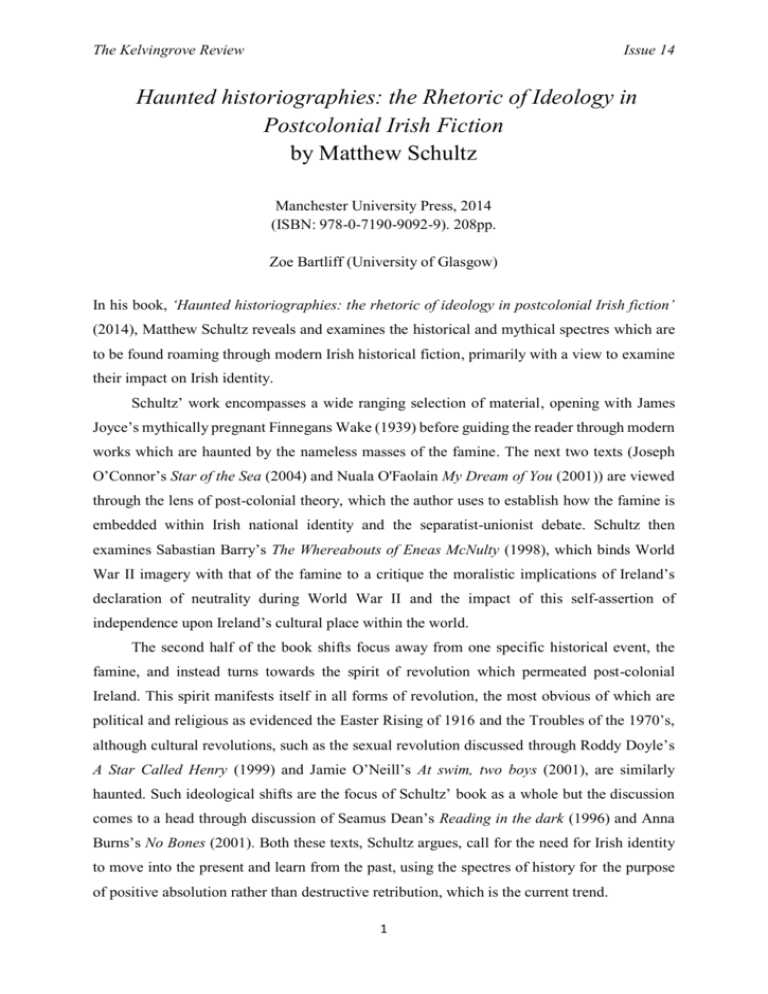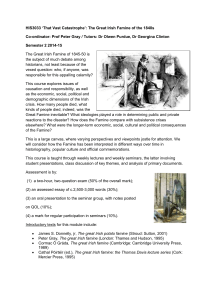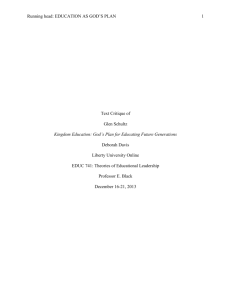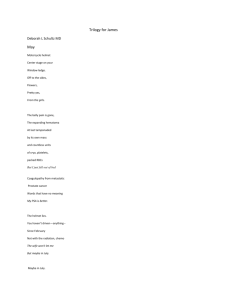TKR14 - University of Glasgow
advertisement

The Kelvingrove Review Issue 14 Haunted historiographies: the Rhetoric of Ideology in Postcolonial Irish Fiction by Matthew Schultz Manchester University Press, 2014 (ISBN: 978-0-7190-9092-9). 208pp. Zoe Bartliff (University of Glasgow) In his book, ‘Haunted historiographies: the rhetoric of ideology in postcolonial Irish fiction’ (2014), Matthew Schultz reveals and examines the historical and mythical spectres which are to be found roaming through modern Irish historical fiction, primarily with a view to examine their impact on Irish identity. Schultz’ work encompasses a wide ranging selection of material, opening with James Joyce’s mythically pregnant Finnegans Wake (1939) before guiding the reader through modern works which are haunted by the nameless masses of the famine. The next two texts (Joseph O’Connor’s Star of the Sea (2004) and Nuala O'Faolain My Dream of You (2001)) are viewed through the lens of post-colonial theory, which the author uses to establish how the famine is embedded within Irish national identity and the separatist-unionist debate. Schultz then examines Sabastian Barry’s The Whereabouts of Eneas McNulty (1998), which binds World War II imagery with that of the famine to a critique the moralistic implications of Ireland’s declaration of neutrality during World War II and the impact of this self-assertion of independence upon Ireland’s cultural place within the world. The second half of the book shifts focus away from one specific historical event, the famine, and instead turns towards the spirit of revolution which permeated post-colonial Ireland. This spirit manifests itself in all forms of revolution, the most obvious of which are political and religious as evidenced the Easter Rising of 1916 and the Troubles of the 1970’s, although cultural revolutions, such as the sexual revolution discussed through Roddy Doyle’s A Star Called Henry (1999) and Jamie O’Neill’s At swim, two boys (2001), are similarly haunted. Such ideological shifts are the focus of Schultz’ book as a whole but the discussion comes to a head through discussion of Seamus Dean’s Reading in the dark (1996) and Anna Burns’s No Bones (2001). Both these texts, Schultz argues, call for the need for Irish identity to move into the present and learn from the past, using the spectres of history for the purpose of positive absolution rather than destructive retribution, which is the current trend. 1 The Kelvingrove Review Issue 14 The most pervasive theme in ‘Haunted Historiographies’ is the fluidity of, and uncertainty surrounding Irish National identity. The texts that Schultz has chosen are all shown neatly defy expectations about the presentation of Irish identity. They demonstrate that, despite its temporal distance, the famine is still immediate in the Irish cultural imagination and yet in spite of this immediacy, the victims of the famine are nameless and faceless which means that they can be manipulated as if they were the subjects of mythology. It is this that has allowed for such fluidity to develop: the famine is the foundation of much of Irish identity and yet it is a foundation which is different from person to person. Both O’Connor’s My Dream of you and O’Faolain’s Star of the Sea, Schultz argues, denounce the good vs evil nature which tends to typify its presentation and thereby turn it away from the traditional separatist-unionist debate. Schultz does not argue this to be the true form of Irish identity but rather utilises these texts to develop his argument, based on Derrida’s theory on the spectrality of identity, that the identity of a culture is based on uncertainty and the inevitable debate which it brings in its wake. Without this a culture would be two-dimensional and bereft of character. It is in light of this that the humanisation of the famine victims found in each of Schultz’ chosen famine texts becomes relevant. They each have a different and very real tale to tell and yet these spectres are not present to tell the reader the truth about the Famine - for historical fiction does not aim to tell the truth, but it works to remind readers of the diversity and contradictory nature of individual human experience and perhaps even to cause the reader to question what they know to be “true” about their own cultural identity. In the section on revolution, there is a slight shift in perspective away from identity construction and towards cultural development. Instead of focusing on the impact of one temporally solid event Schultz examines the revolutionary zeitgeist which has grown and developed since the Easter Rising in 1916. Stepping away from the traditionally used separatist-unionist political standpoint Schultz opens up the revolutionary spirit which led to the Easter Rising and eventually the Troubles and views them in terms of the social revolution which lay at their heart. Furthermore, taking inspiration from Derrida’s philosophy, Schultz discusses the cyclical nature of each revolution as it is haunted by the spectres, the menaces, as well as the spirit, the life and soul, of past cultural disturbances. It is not then, as is said in the old idiom, failure to learn from the past that causes people to repeat it, but rather a failure to recognise the fact that the past is always present, haunting cultural and social development, which causes the repetition of history, with often devastating effects. Unlike the first section of the book, the second lacks focus in its development. The overarching theme of revolutionary thought is clear and present throughout but Schultz dips into several different analytical 2 The Kelvingrove Review Issue 14 approaches including queer and feminist theory, views on the Gothic and elements of ancient and medieval mythology. Each of these elements are fascinating but are, at times, abandoned when there is still much more room for discussion. However, he ideas raised are, without a doubt, as thought provoking as in the first section of the book. On the whole Schultz offers a fairly unique perspective on modern Irish historical fiction which is useful to cultural, literary and historical scholars alike. By taking inspiration primarily from Derrida and other eminent scholars, Schultz examines how time and historical incidence converge with the present to aid in the formation of both independent and national identities within Ireland. He demonstrates how history so easily becomes mythology particularly when it grows naturally within the public subconscious. Bibliography Schultz, Matthew. 2014. Haunted historiographies: the rhetoric of ideology in postcolonial Ireland. Manchester University Press: Manchester. 3







